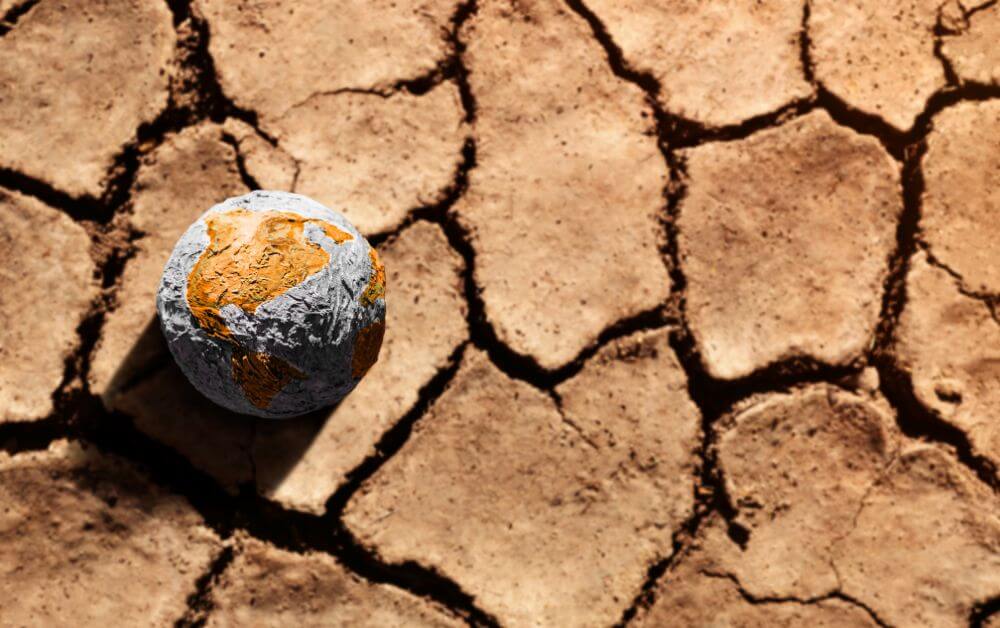It’s September 2082, and we mark the 50th anniversary of the official start of what has become The Great 50-Year Global Drought. Cities have been emptied, country borders changed, wars fought and entire economies gutted… and there seems to be no end in sight.
This episode of ThrowForward Thursday is based on historical facts. Back in 1177BC, a 300-year drought caused the almost complete collapse of multiple civilisations in the Middle East and Eastern Mediterranean areas. You can listen to Dan Snow’s History Hit podcast, as he interviews Eric Cline, the author of ‘1177 B.C.: The Year Civilization Collapsed’.
It’s a sobering lesson from the past. It’s an alarming possibility for our future.
TRANSCRIPT
Today, we commemorate the 50th anniversary of the beginning of the great global drought. That’s right. Back in 2032, 50 years ago today, we first recognised that the world was in the grips of a global catastrophic drought, and here we are 50 years later, and we’ve seen the effects of collapsed and empty cities, of people needing to migrate, and of course, global famine and significant change.
My name is Graeme Codrington, this is ThrowForward Thursday and for the last few weeks, I’ve started these scenarios with a breaking news story from the future. Today’s story is not actually from the future, it’s from the past. In fact, it wasn’t even 50 years of major drought, it was a 300-year drought that brought the end of the Bronze Age, and particularly the collapse of the Eastern Mediterranean cultures that we only now can see in archaeological findings.
I highly recommend Dan Snow’s History Hits podcast and the episode on the Bronze Age Collapse, I’ll put a link to it in the show notes. He interviewed the author Eric Klein, who wrote the book 1177 BC, the Year Civilization Collapsed, and its sequel, After 1177 BC, the Survival of Civilizations.
And in his book, he talks about the way in which the vast interconnected civilizations of the Eastern Mediterranean collapsed quite dramatically after a 300-year period of significant global climate change and drought in particular. There was climate catastrophe and famine and drought and invasion that caused massive amounts of people to move and migrate, which brought them into conflict with each other, left vast areas of the world that they had inhabited empty and moved people to new areas.
In his book, Eric Klein talks about who survived and why and the technologies that allowed them to move then into the next era beyond the Bronze Age, into the Iron Age. And it is a significant story to understand because it talks about what happens over a long period of time when the conditions that make life livable change dramatically.
And that’s really where we do find ourselves today. I know that there’s a bit of culture war discussion and conversation about whether climate change is happening and what the causes are and what we should do about it. But if you take the culture war noise out of it, there’s no doubt that the world in which we live is being stressed and is under pressure, and that the weather patterns and climate that most of us grew up with has significantly changed at the moment.
And we need to be considering what the world will look like if significant parts of the world are no longer inhabitable as they are now, what that will do to migration and to country borders and to the use of resources, especially shared resources, like water from rivers that flow through multiple countries in different states.
We cannot ignore this as a major potential crisis for the world and a major cause of significant shifts to the geopolitical reality of our world. You cannot live in the world that we live in today and not think about how civilization might change and even collapse in our lifetimes, or at least by the end of the century.
A little bit of a sobering wake-up call with a massive lesson from history for our future. Go and listen to that episode of Dan Snow’s History Hits. I’m sure you’ll enjoy it.
As always thank you for joining me in the ThrowForward Thursday Studio. I’ll see you again next week.
At TomorrowToday Global, we help clients around the world analyse major global trends, developing strategies and frameworks to help businesses anticipate and adapt to market disruption in an ever-changing world.
Subscribe to our team’s weekly newsletter filled with insights and practical resources to help you succeed in the future of work.
For all enquiries, please use this email: [email protected]
Graeme Codrington, is an internationally recognised futurist, specialising in the future of work. He helps organisations understand the forces that will shape our lives in the next ten years, and how we can respond in order to confidently stay ahead of change. Chat to us about booking Graeme to help you Re-Imagine and upgrade your thinking to identify the emerging opportunities in your industry.
For the past two decades, Graeme has worked with some of the world’s most recognised brands, travelling to over 80 countries in total, and speaking to around 100,000 people every year. He is the author of 5 best-selling books, and on faculty at 5 top global business schools.


